« Your Last One Is ALSO My Last One!! »

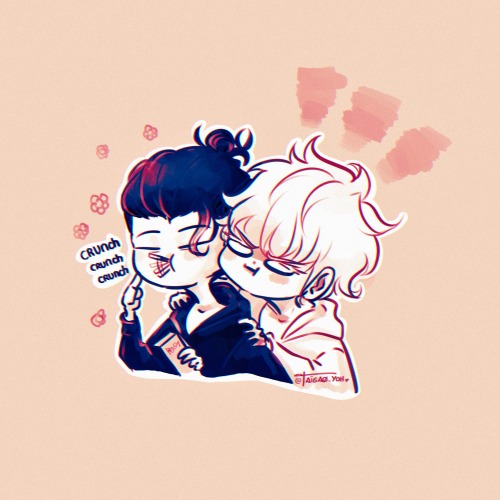
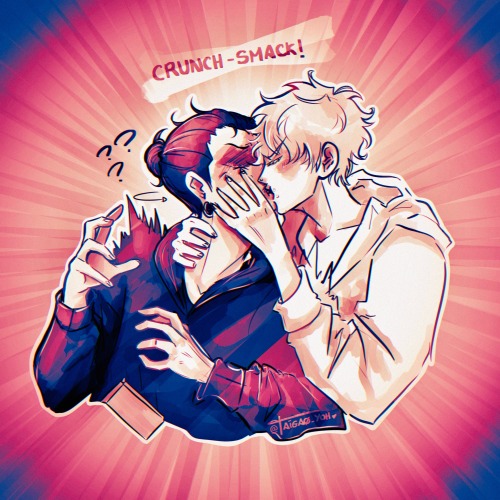
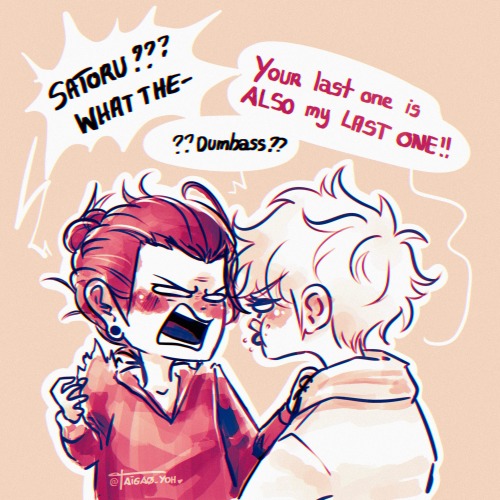
« Your last one is ALSO my last one!! »
More Posts from Doyoulikeslimes and Others

Seems like only last year
You were teaching
Life can fill you with fear
But it ain't just suffering
And now irony would have it
That I teach it back to you
finished playing Snufkin: Melody of Moominvalley recently, have some fanart 💖
Thread from my twitter about this official art because it’s one of my favorite official anime art. This is actually part 1 because alot of people wanted a soukoku specific/Dazai focused part. So will post that here as well.
Starting off:
They’re gorgeous here but what I really love is the detail of the red thread of fate. More specifically how & where the thread is wrapped for skk & sskk + Kyoka. I’ll start with skk.

When it comes to Soukoku, my loves, Dazai has the thread wrapped around his neck. Chuuya has one end & it’s wrapped around his wrist (the one with the scar that proves he’s human btw), that seems to symbolize he's holding Dazai's life in his hands, at least partially. That's no surprise we all know they're inexplicably linked and fated etc.
Chuuya is always there to save Dazai & Asagiri said he’s the only one who truly understands Dazai. But it's super interesting the other half of Dazai's string that’s wrapped around his neck is first wrapped around his own wrist, before continuing to Aku. This essentially saying Dazai holds his own life in his hands.
Which obviously seems super accurate since we know his is biggest enemy is often his own mind & the hole inside his chest that he has a hard time filling. It’s where his suicidal tendencies come from. But essentially, it seems like Dazai's life is held only by Chuuya & then himself and I love that detail.
This is in contrast to Atsushi, Akutagawa, & Kyoka. The thread is wrapped around Atsushi's throat & Aku & Kyoka both have it around their wrists. Essentially symbolizing *both* Aku & Kyoka have Atsushi’s life in their hands. This seems to showcase both of their importances in Atsushi’s life.
Also other than dead apple, given recent events with Kyoka saving Atsushi in the beginning of the DOA arc & Akutagawa's sacrifice for him later, that red thread being held by them continues making sense.
Also Aku's sacrifice was massive for his development & I hope it is our universes Aku at the end of episode 11 so we can continue exploring that development for himself & his relationship with Atsushi.
The red thread itself is typically to symbolizes those who are destined to be together, regardless of place or time. Which naturally makes sense for soukoku & their “two bodies one soul” situation lol It’s interesting that Atsushi has both Aku & Kyoka linked to him in this sense.
That’s just my take on the art & why it’s one of my favorites.

i just realized today why their ship is called thousand sunny 😭

Word Prompt: Briefing
Hits the button to go to the next slide and it's a 20 second cube transition
[Art Date: February 27 2025]

Jjk chapter 271 reaction comic anyone?


this part makes me so sad so so so sad
i like akechi so much. silly little walking encyclopedia.
Just going to rant about something I think I noticed in the new season, I am very very sleepy so this probably makes sense to me
-spoilers for the new season-
During the first season of the reboot Brain was very composed unlike in the third season. Where season one Brain wouldn’t be seen crying, even when he explained his backstory to Pinky, in seasons 2-3 he is shown as much more emotional. But in season 3 this guy seems to be actually loosing it
In their last segment (How the Brain Thieved Christmas) Brain’s eyes were always uneven and look a little crazy


He was irrationally mad throughout the entire episode and couldn’t seem to focus at all, which is uncharacteristic of him, especially when in season one he would never lose his train of thought wouldn’t happen
Brain definitely was getting more ‘emotional’ during the second season and let it slip a few times but I think what started to get to him was the episode Talladega Mice, with having to talk with Pinky and help him work through with his stress, having to contain some emotion. Then the episode Groundmouse Day happened and I think it really got to Brain and caused him to go a bit mad. After that, Brain has been saying and doing things spontaneously and is showing a completely different side while trying to maintain his ‘stern monotone’ facade. Its surreal to see
And with this, its also obvious how much he has changed in the physical touch area, whereas in season 1 and 2, he would grab Pinky’s hand a lot, pull him really close without having a second thought, season 3 Brain is completely different
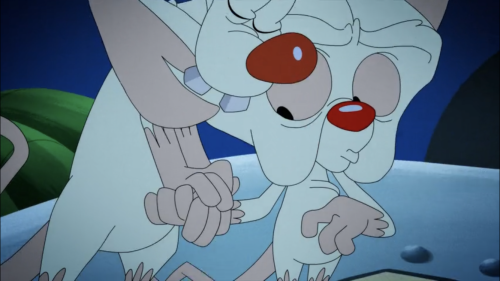
He gets flustered over just a hand hold that is no different from every other time from the past 30 years
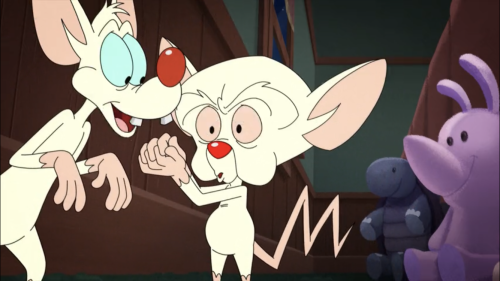

Then there’s the kiss from Groundmouse Day that has him stunned while (probably in season 1) Brain gets kissed but he shows only aggression
Brain’s affection, or more just interacting with Pinky has decreased in this season and he seems to keep getting flustered over something Pinky has done a million times
So I think with all this information combined, I believe that Brain has been getting more insane if you will, or is in an odd headspace, and the suddenish change could be Brain has been getting unstable and could be causing his slip up in affection, or he knows about his blatant love for Pinky that it in turn is causing his insanity
Who knows which one it is, honestly I think its the latter
But hey thats just a theory
a Film Theory

The Man-God: BSD’s Dostoyevsky and Demons’ Kirillov
So, I finally read Bungou Stray Dogs. And y’all, I freaking love this manga. It’s got themes of life, grief, death, trauma, and is chock-full of literary references and puns.

Shocking no one, one of my favorite characters–the reason I started reading the story–is Dostoyevsky, since I’m… rather an admitted fangirl of Dostoyevsky’s novels. I’ve reread each of them at least twice and some (C&P) up to five times. Clearly BSD’s Dostoyevsky not the hopeful, faithful author, but he’s definitely a fascinating antagonist whose arc is digging into the themes of Dostoyevsky the writer’s novels–with a particular focus on the two novels that are my very favorite novels ever written, by anyone, in history: Crime and Punishment and Demons.
But in truth, it draws more from Demons than from Crime and Punishment, right down to having BSD!Dostoyevsky directly quote it.
Demons is far, far less popular that Crime and Punishment, The Brothers Karamazov, and even The Idiot, so I was really surprised to see how often it’s been referenced in BSD (The reason it’s less popular is honestly justified: the first 100 pages are paced… horribly, but the rest of the novel is so powerful that I can overlook that). It’s been translated under a variety of titles as well: The Possessed, The Devils, and the most recent is Demons so that’s what we’re going with in this meta.
Pssst–look at how often BSD!Dostoyesvky is associated with demons or devils:


Yet Demons has been popular with literary theorists (one well-known critic has described it as containing “the most harrowing scene in all of fiction,” an assessment I’d agree with–and this is the scene I’m going to discuss in detail) and existentialists like Camus (sorry Camus). Anyways, I have a soft spot for Demons because it contains my very favorite character in existence: Alexei Nilyich Kirillov, who is the character BSD!Dostoyesvky directly quotes.

@blackandwhitemusician did a great analysis of the similar philosophies BSD!Dostoyevsky shares with Crime and Punishment’s Raskolnikov, but I want to talk about how BSD!Dostoyevsky is also modeled after Kirillov’s philosophical ideas. This isn’t to say he embodies them, because Kirillov is decidedly not a villain unlike BSD!Dostoyevsky, but BSD!Dostoyevsky definitely draws heavily from Kirillov’s ideals.
Kirillov is a character who, like Raskolnikov, embodies the contradictions of human nature, but in a hyperbolic way. He’s noted to have a “calm but warm and kindly expression"and adores children, playing with them, and he even helps his friend Shatov’s wife give birth (he’s endearingly awkward and scared for the whole ordeal). He affirms that he is “fond of life” and yet he is determined, from the moment we meet him, to shoot himself as suicide because in doing so he will save himself and the world.

Kirillov’s reasoning is complex and at the same time, spotty, and stems from a deep despair and disgust with human sin. Sound familiar?


Time is also a major motif with BSD! Dostoyevsky and with Kirilllov. He does not believe in time as more than an “idea.” He insists that “life exists, but death doesn’t at all… [I believe] in eternal life here. There are moments, you reach moments, and time suddenly stands still, and it will become eternal.”

(Clocks constantly appear in BS chapter 42, Dostoyevsky’s introduction, as well.)
Kirillov also draws from other philosophies such as Descartes’ “I think, therefore I am,” affirming that “man is unhappy because he doesn’t know he’s happy… If they knew that it was good for them, it would be good for them, but as long as they don’t know it’s good for them, it will be bad for them. That’s the whole idea, the whole of it… They’ll find out that they’re good and they’ll all become good, every one of them.”
In other words, reality is what Kirillov makes of it in his own mind, which is what BSD!Dostoyevsky hints his ability is (but it isn’t).


It’s still a belief BSD!Dostoyevsky holds: that his beliefs create reality.

Kirillov muses, in conversation with his friend Stavrogin (bold is Kirillov):
“He who teaches that all are good will end the world.”
“He who taught it was crucified.”
“He will come, and his name will be the man-god.”
“The god-man?”
“The man-god. That’s the difference.”
In BSD, anything written in The Book becomes truth, and Dostoyevsky plans to use it to rid the world of the sins of ability-users. Similarly, Kirillov plans to use his decision to set people free, and Pyotr plans to use Kirillov’s mental instability and philosophical suicide to erase consequences for his own sins. And as Kirillov also believes this will make moments heaven, Dostoyevsky expresses (using religious language) that this will make a heavenly reality as well:

As Demons goes on, we find out that Pyotr Stepanovich had struck a deal with Kirillov. Since Kirillov really tries to believe that everyone and everything is good, when Pyotr asks him to kill himself and write a note specifying something Pyotr won’t specify until the time comes, to help Pyotr, Kirillov agrees. Pyotr notes that he doesn’t tell Kirillov what he plans—to have Kirillov take the blame for the murder of their mutual friend Shatov, which Pyotr commits—because he thinks that if Kirillov knows in advance, “Kirillov could not be relied upon.”
The irony, of course, is that by seeking to prove the ultimate will in the universe is of the individual, that the individual is his/her own god, Kirillov becomes an unwitting tool in Pyotr Stepanovich’s terrible plots. He contributes to the unjust death of someone he cares deeply for by taking the blame. And Kirillov did not want this at all. When Pyotr comes to collect, he realizes what he’s done (bold is Kirillov_:
“He is dead!” cried Kirillov, jumping up from the sofa.
“He died at seven o’clock this evening, or rather, at seven o’clock yesterday evening, and now it’s one o’clock.”
“You have killed him!”
…
“You are a strange man, though, Kirillov; you knew yourself that the stupid fellow was bound to end like this. What was there to foresee in that? I made that as plain as possible over and over again. Shatov was meaning to betray us; I was watching him, and it could not be left like that. And you too had instructions to watch him; you told me so yourself three weeks ago.…”
…
“I won’t write that I killed Shatov … and I won’t write anything now. You won’t have a document!”
Pyotr refuses to leave until Kirillov is dead, and Kirillov explains that “I won’t put it off; I want to kill myself now: all are scoundrels.” The exact opposite of what he expressed before about things being good.
“He’s guessed the truth at last! Can you, Kirillov, with your sense, have failed to see till now that all men are alike, that there are none better or worse, only some are stupider, than others, and that if all are scoundrels (which is nonsense, though) there oughtn’t to be any people that are not?”
And then we see what motivates Kirillov is a desperate need to have a reason to match his desire to live. It’s literally one of the main themes of Bungo Stray Dogs (bold is Kirillov):
“If you stopped yourself, you become God; that’s it, isn’t it?”
“Yes, I become God.”
…
“Let it be comfort. God is necessary and so must exist… But I know He doesn’t and can’t… Surely you must understand that a man with two such ideas can’t go on living?”

And of course, this is BSD!’s Dostoyevsky in what I am betting is a direct quote from Demons as translated into Japanese: If god does not exist, then I am god.


His man-god belief, like Dostoyevsky’s in BSD, are explained thusly (bold is Kirillov):
“I’ve always been surprised at every one’s going on living,” said Kirillov, not hearing his remark.
…
“Hold your tongue; you won’t understand anything. If there is no God, then I am God.”
“There, I could never understand that point of yours: why are you God?”
“If God exists, all is His will and from His will I cannot escape. If not, it’s all my will and I am bound to show self-will.”
“Self-will? But why are you bound?”
“Because all will has become mine. Can it be that no one in the whole planet, after making an end of God and believing in his own will, will dare to express his self-will on the most vital point? It’s like a beggar inheriting a fortune and being afraid of it and not daring to approach the bag of gold, thinking himself too weak to own it. I want to manifest my self-will. I may be the only one, but I’ll do it.”
That’s a direct quote.
BSD!Dostoyevsky manipulates human will to lead people into committing suicide, and is killing them to create a new world without the sins of ability-users:

Kirillov says this right before he finally writes the false confession to Stavrogin’s murder and kills himself:
“Man has done nothing but invent God so as to go on living, and not kill himself; that’s the whole of universal history up till now. I am the first one in the whole history of mankind who would not invent God. Let them know it once for all…
“I am awfully unhappy, for I’m awfully afraid. Terror is the curse of man.… But I will assert my will, I am bound to believe that I don’t believe. I will begin and will make an end of it and open the door, and will save. That’s the only thing that will save mankind and will re-create the next generation physically; for with his present physical nature man can’t get on without his former God, I believe. For three years I’ve been seeking for the attribute of my godhead and I’ve found it; the attribute of my godhead is self-will! That’s all I can do to prove in the highest point my independence and my new terrible freedom. For it is very terrible. I am killing myself to prove my independence and my new terrible freedom.”
Yet Kirillov is inventing god: himself. He signs the paper and then does kill himself, but it’s not without the last terrible, terrifying realization that he does not want to die. He wants to live. And he fights Pyotr, biting his finger nearly off, before committing suicide. But Kirillov, as wrong and tragic as his philosophy is, is the one who recognizes the theme of Demons.
“Stavrogin, too, is consumed by an idea,” Kirillov said gloomily, pacing up and down the room.
The point of the entire tragedy in Demons is basically if you are consumed by an idea, it will turn you into a devil. Kirillov is, along with Shatov, perhaps the most likeable main character in Demons (others are far more horrifying as their various political, religious, and philosophical ideas take them over). And so is Dostoyevsky in BSD: consumed by his ideas, convinced his will is all that matters.
It won’t end well.
-
 oops123migget liked this · 1 month ago
oops123migget liked this · 1 month ago -
 mikonikkol liked this · 1 month ago
mikonikkol liked this · 1 month ago -
 squideddd liked this · 2 months ago
squideddd liked this · 2 months ago -
 ephemeral-darkness liked this · 2 months ago
ephemeral-darkness liked this · 2 months ago -
 lmskitty reblogged this · 2 months ago
lmskitty reblogged this · 2 months ago -
 lmskitty liked this · 2 months ago
lmskitty liked this · 2 months ago -
 doyoulikeslimes reblogged this · 7 months ago
doyoulikeslimes reblogged this · 7 months ago -
 shinkai-uwu liked this · 8 months ago
shinkai-uwu liked this · 8 months ago -
 anima-09 liked this · 8 months ago
anima-09 liked this · 8 months ago -
 a1k024 reblogged this · 9 months ago
a1k024 reblogged this · 9 months ago -
 a1k024 liked this · 9 months ago
a1k024 liked this · 9 months ago -
 i-hccopy liked this · 9 months ago
i-hccopy liked this · 9 months ago -
 ghostofarcadia17 liked this · 10 months ago
ghostofarcadia17 liked this · 10 months ago -
 lolstxrz liked this · 10 months ago
lolstxrz liked this · 10 months ago -
 coff-beans liked this · 10 months ago
coff-beans liked this · 10 months ago -
 childofdemon reblogged this · 10 months ago
childofdemon reblogged this · 10 months ago -
 childofdemon liked this · 10 months ago
childofdemon liked this · 10 months ago -
 sleezzsister reblogged this · 10 months ago
sleezzsister reblogged this · 10 months ago -
 sleezzsister liked this · 10 months ago
sleezzsister liked this · 10 months ago -
 jaybirdstab liked this · 10 months ago
jaybirdstab liked this · 10 months ago -
 thesadcloud liked this · 11 months ago
thesadcloud liked this · 11 months ago -
 deemkin liked this · 11 months ago
deemkin liked this · 11 months ago -
 noophuniintended-blog liked this · 11 months ago
noophuniintended-blog liked this · 11 months ago -
 goldenrosesstuff liked this · 11 months ago
goldenrosesstuff liked this · 11 months ago -
 ladynightlark liked this · 11 months ago
ladynightlark liked this · 11 months ago -
 ludius-00 liked this · 11 months ago
ludius-00 liked this · 11 months ago -
 charliethepsydog liked this · 11 months ago
charliethepsydog liked this · 11 months ago -
 thetranskingneo liked this · 11 months ago
thetranskingneo liked this · 11 months ago -
 sokittygentlemen liked this · 11 months ago
sokittygentlemen liked this · 11 months ago -
 babyboyorion liked this · 1 year ago
babyboyorion liked this · 1 year ago -
 bee-n-doodle liked this · 1 year ago
bee-n-doodle liked this · 1 year ago -
 gw3nwhatever liked this · 1 year ago
gw3nwhatever liked this · 1 year ago -
 djkokusnuss reblogged this · 1 year ago
djkokusnuss reblogged this · 1 year ago -
 djkokusnuss liked this · 1 year ago
djkokusnuss liked this · 1 year ago -
 immortalphoenix07 liked this · 1 year ago
immortalphoenix07 liked this · 1 year ago -
 ocyeanicx liked this · 1 year ago
ocyeanicx liked this · 1 year ago -
 arabellatreaty liked this · 1 year ago
arabellatreaty liked this · 1 year ago -
 star-maker-rain-dancer liked this · 1 year ago
star-maker-rain-dancer liked this · 1 year ago -
 goddessofwaifus liked this · 1 year ago
goddessofwaifus liked this · 1 year ago -
 touyas-moon liked this · 1 year ago
touyas-moon liked this · 1 year ago -
 tectonic-bones liked this · 1 year ago
tectonic-bones liked this · 1 year ago -
 tug-tries-to-draw liked this · 1 year ago
tug-tries-to-draw liked this · 1 year ago -
 foggydetectivegiver liked this · 1 year ago
foggydetectivegiver liked this · 1 year ago -
 ao-emi1 liked this · 1 year ago
ao-emi1 liked this · 1 year ago -
 rubyleigh2000 liked this · 1 year ago
rubyleigh2000 liked this · 1 year ago -
 ryan-c-a liked this · 1 year ago
ryan-c-a liked this · 1 year ago -
 arithegreat-666 liked this · 1 year ago
arithegreat-666 liked this · 1 year ago
